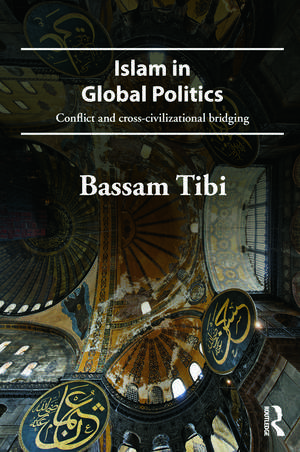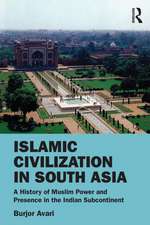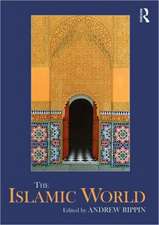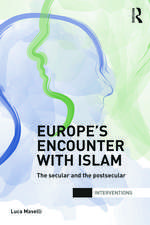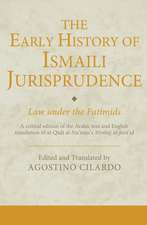Islam in Global Politics: Conflict and Cross-Civilizational Bridging
Autor Bassam Tibien Limba Engleză Paperback – 24 feb 2012
Bassam Tibi takes a highly original approach to the topic of religion in world politics, exploring the place of Islam in society and its frequent distortion in world politics to the more radical Islamism. Looking at how this becomes an immediate source of tension and conflict between the secular and the religious, Tibi rejects the 'clash of civilizations' theory and argues for the revival of Islamic humanism to help bridge the gap. Chapters expand on:
- inter-civilizational conflict in global politics
- dialogue between religious and secular, East and West
- western concepts of Islamism
- euro-Islam and the Islamic diaspora in Europe
- Islamic humanism as a tool for bridging civilizations.
| Toate formatele și edițiile | Preț | Express |
|---|---|---|
| Paperback (1) | 485.40 lei 6-8 săpt. | |
| Taylor & Francis – 24 feb 2012 | 485.40 lei 6-8 săpt. | |
| Hardback (1) | 1002.50 lei 6-8 săpt. | |
| Taylor & Francis – 24 feb 2012 | 1002.50 lei 6-8 săpt. |
Preț: 485.40 lei
Nou
Puncte Express: 728
Preț estimativ în valută:
92.88€ • 96.97$ • 76.87£
92.88€ • 96.97$ • 76.87£
Carte tipărită la comandă
Livrare economică 04-18 aprilie
Preluare comenzi: 021 569.72.76
Specificații
ISBN-13: 9780415686259
ISBN-10: 0415686253
Pagini: 240
Dimensiuni: 156 x 234 x 15 mm
Greutate: 0.36 kg
Ediția:1
Editura: Taylor & Francis
Colecția Routledge
Locul publicării:Oxford, United Kingdom
ISBN-10: 0415686253
Pagini: 240
Dimensiuni: 156 x 234 x 15 mm
Greutate: 0.36 kg
Ediția:1
Editura: Taylor & Francis
Colecția Routledge
Locul publicării:Oxford, United Kingdom
Public țintă
Postgraduate and UndergraduateCuprins
1. The Inter-Civilizational Conflict in World Politics: Value-Conflicts and Bridging in the Pursuit of Post-Bipolar Peace 2. Inter-Cultural Dialogue as a Global Communication in Pursuit of Bridging: Cultural Particularisms and Value Conflicts Among the Civilizations 3. The New Intercivilizational Cold War of Ideas and Alternatives to it 4. What Islam for Bridging? The Heterogeneity of Civilizations as a Background for the Plea to Revive the Grammar of Islamic Humanism 5. Euro-Islam as a Vision for Bridging: A Liberal and Secular Islam for the Islamic Diaspora in Europe 6. The Inter-Civilizational Conflict, Bridging and Critical Theory: The Western Third-Worldist Romantizication of Islamism and Beyond 7. From Conflict to Bridgings: Conclusions
Notă biografică
Bassam Tibi is a Professor Emeritus of International Relations. Between 1973 and 2009 he taught at the University of Goettingen, and he was A.D. White Professor at Large at Cornell University until 2010. His work has been translated into 16 languages, and he has published a great number of books including Islam’s Predicament with Modernity (Routledge, 2009) and Islam, World Politics and Europe (Routledge, 2008). The president of Germany Roman Herzog decorated him in 1995 with the highest Medal/State Decoration for his "bridging between Islam and the West".
http://wwwuser.gwdg.de/~uspw/iib/index_eng.html
http://wwwuser.gwdg.de/~uspw/iib/index_eng.html
Recenzii
"This book is a well-written work which links many fields and topics of politics, religious studies, Islamic studies, international relations, history, sociology, philosophy, logic and so on. Nonetheless, this work is mostly able to meet the expectation of political studies and international relations student in an advanced level." - Majid Daneshgar, Academy of Islamic Studies, University of Malaya; Journal of Islam and Christian-Muslim Relations
Descriere
This book examines global and local politics and how Islam impacts on "civilizational" relations between different groups and polities. In particular he examines how Islamism (as opposed to Islam) becomes an immediate source of tension and conflict between the secular and the religious. Tibi rejects the "clash of civilizations" theory and argues for the revival of Islamic humanism to help bridge the gap.
